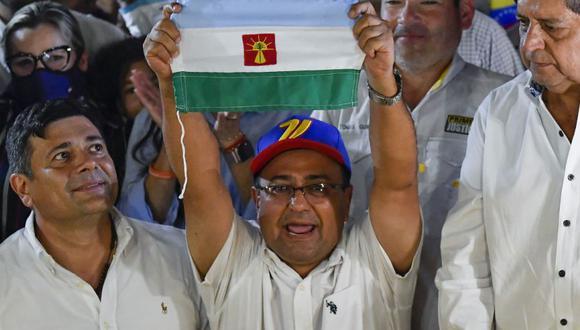
Venezuela: PSUV Loses Barinas to Opposition in Election Re-Run
Mérida, January 10, 2022 (venezuelanalysis.com ) – Right-wing politician Sergio Garrido has defeated former Foreign Minister Jorge Arreaza by 55% to 41% in a re-run of Barinas state's governor election.
The Sunday result sees the ruling United Socialist Party (PSUV) lose control of the iconic birthplace of former president Hugo Chávez for the first time.
Barinas residents were called to take to the polls again after the November 21 results were annulled by the TSJ nine days later. According to the ruling, Democratic Unity Roundtable's (MUD) Freddy Superlano ̶ who was leading incumbent PSUV governor Argenis Chávez by 0.4% at the time ̶ had been barred from holding public office by the ombudsman in August 2020. The cause of the disqualification was not made public and electoral authorities claimed to not be aware of the measure.
Unofficial estimates indicate that both Garrido and Arreaza increased their parties' counts on Sunday by roughly 70,000 and 26,000, respectively, with smaller blocs such as the moderate-right Democratic Alliance losing out. Participation rose from 45% to 51%.
Following the announcement, Garrido, who previously held office as a city councilor and regional lawmaker, celebrated, stating that the“noble, loyal and brave people of Barinas [had] won.” One of his supporters, Karmín Sánchez, claimed that“we had to win twice, but we managed it.”
Other opposition leaders, including self-proclaimed“Interim President” Juan Guaidó and former presidential candidate Henrique Capriles , also lauded the victory. Zulia state Governor Manuel Rosales said that the victory proved that the“electoral route” works, while El Hatillo Mayor Elías Sayegh (Caracas) highlighted the importance of the results for the opposition as a whole.
“If the opposition had done everywhere what was done in Barinas (unity, massive participation, defending votes), we would have won at least 15 governorships and 200 mayoralties [in the November elections]. Let's learn our lesson!” he wrote.
The opposition won three governorships in November's“mega-elections,” defeating the ruling party in Zulia, Cojedes and Nueva Esparta states. The PSUV won the remaining 19 states despite having less than 50% of the vote.
For his part, Arreaza quickly conceded defeat via Twitter, stating that“the objective has not been achieved” and thanking those who voted for him. On Monday, he added that the ruling party needed an internal review and to lend more support to popular power.
Previous Next barinas_0.png Barinas state is the doorway to Venezuela's plains. (Wikipedia) results-breakdown-v02b_map.jpg The ruling PSUV benefitted from opposition splits to secure most states in the November“mega-elections.” (Venezuelanalysis)Barinas is considered to be symbolically important for the government. Apart from its important location on a major trade route and as a key agricultural state, it is the birth state of former-president Hugo Chávez and has been dominated by his family since 1999.
Nonetheless, the region has been one of the hardest hit by deteriorated public services , such as electricity and water supply, as well as fuel and gas shortages . The government had unveiled a host of funding initiatives and infrastructure projects in the build-up to Sunday's vote, as well as assigning land titles to campesinos.
The annulment of November's results and the holding of a re-run had further fuelled anger in many sectors, with local opposition leaders describing it as“unconstitutional.”
In November, National Electoral Council (CNE) Deputy Rector Francisco Martínez likewise voiced his concern, resigning from office and citing“political disqualifications [and] judicial interventions which hinder and contaminate electoral processes.” Likewise, current CNE Rector Roberto Picón claimed that the TSJ's ordering an election repeat“not only flies in the face of the National Electoral Council's powers but also of the will of the people of Barinas.”
On Friday, Picón further cited the ruling party's use of state employees, installations, vehicles and other assets for its campaign, arguing that CNE mechanisms to control or castigate violations of electoral law were“insufficient.”
Regional opposition leaders had also previously expressed their anger after electoral authorities inexplicitly blocked a handful of postulations to replace Superlano.
Likewise, the Popular Revolutionary Alternative (APR), which ran in November on the Communist Party (PCV) ticket, denounced the disqualification of its candidate after the closure of the postulations period, leaving the coalition without a contender. The bloc later denounced “power abuses and shameful advantages” in the Barinas re-run.
MENAFN10012022000214011058ID1103517597

Legal Disclaimer:
MENAFN provides the
information “as is” without warranty of any kind. We do not accept
any responsibility or liability for the accuracy, content, images,
videos, licenses, completeness, legality, or reliability of the information
contained in this article. If you have any complaints or copyright
issues related to this article, kindly contact the provider above.























Comments
No comment